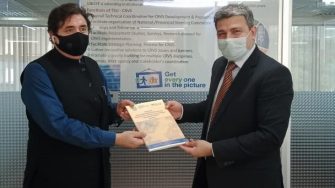School alumnus leads gap analysis of birth and death records to address inequities
A first-of-its kind report maps out the road to universal registration of births and deaths in Pakistan to ensure national policies and programs are inclusive.
A first-of-its kind report maps out the road to universal registration of births and deaths in Pakistan to ensure national policies and programs are inclusive.

In South Asia, 546 million people are living in poverty. In Pakistan and Afghanistan, one in four people lives in severe poverty. Socio-economic factors contribute to inequalities of registration of births and deaths.
Information disaggregated by age, sex, location, and socio-economic status is not available in Pakistan through a regular and complete civil registration and vital statistics system, which is crucial for informing public policies.
Dr Jasim Anwar, alumnus and visiting fellow of UNSW School of Population Health, is the lead author of a new report addressing this information gap in Pakistan.
The report, Gap Analysis of Current CRVS Registration Practices and Mapping of Potential Data-Sources Focusing on Marginalized Populations in Pakistan, provides an overview of current practices of civil registration and vital statistics (CRVS) and data, examining CRVS systems in the context of marginalised population groups in Pakistan.
According to Dr Anwar, Pakistan, like many other countries in the region, has an incomplete and fragmented system for registration of births and deaths and is lacking in reporting complete and accurate data on causes of deaths.
"Pakistan has committed to making civil registration accessible to everyone to ensure national and provincial policies are inclusive – this necessitates addressing inequalities in access to civil registration services nationally," explains Dr Anwar.
"The findings of the report provide a strong foundation for the Government of Pakistan to link the data of marginalised populations with Pakistan's civil registration system, at national and provincial levels," he said.
"The report will guide both national and local government departments to increase the population coverage and completeness of civil registration to bring everyone into the picture," he said.
In 2014, Pakistan, like other Asian countries, endorsed the Ministerial Declaration at 'Get Every One in the Picture' in Asia and the Pacific in recognition of the need to address disparities in the civil registration coverage of hard-to-reach and marginalised populations, including people living in rural, remote, isolated or border areas, Indigenous people, migrants, non-citizens, refugees, and people without documentation.
"The COVID-19 pandemic has adversely affected the livelihoods of people across the world, and access to services has been badly affected, including civil registration," said Dr Anwar.
"The pandemic has highlighted the need for digital solutions for improving access and complete and universal death registration along with an accurate recording of causes of deaths," he said.
The report outlines the perspective of marginalised populations on the barriers to civil registration, such as the lack of awareness of the importance of birth registration, and financial barriers such as the cost of a registration certification, transport costs, and loss of income from the days spent getting the certificate. Other barriers are procedural, such as needing to provide unnecessary documentation, and generally the inability to access services because of distance or a disability.
The study is a part of the development cooperation of the United Nations Economic and Social Commission for Asia and the Pacific (ESCAP) to the Ministry of Planning Development and Special Initiatives, Islamabad, Pakistan, with a focus on increasing the ability of Pakistani government officials to assess and improve the CRVS system, so it is more comprehensive and inclusive at national and provincial levels.
Dr Anwar is engaged with the Planning Commission of Pakistan and ESCAP as their consultant for Strengthening CRVS in Pakistan.
ESCAP commissioned Dr Anwar to conduct the study for the Government of Pakistan, under the technical guidance of the Technical Support Unit-CRVS, Ministry of Planning Development and Special Initiatives, Islamabad. Local governments in provinces participated in the study.
Photo: Dr Jasim Anwar (right) presenting the CRVS report to Dr Qaiser Khan, Deputy Chief Health, Ministry of Planning, Development and Special Initiatives, Pakistan
Contact Name :
UNSW School of Population Health